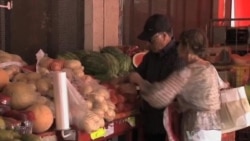LONDON —
The European Union is pushing ahead with plans to force Israeli companies operating in the West Bank and East Jerusalem to label the origin of their products. It comes as Israeli and Palestinian delegations begin peace talks for the first time since 2010.
Israel’s continued construction of settlements on land captured in the 1967 Arab-Israeli war has been a major obstacle to a peace deal. Currently products made by Israelis in the occupied territories are sold under the ‘Made in Israel’ label.
The European Union is pushing through rules to ensure products from the occupied territories are labeled as such.
The policy would implement longstanding consumer legislation, Maja Kocijancic, spokesperson for EU Foreign Affairs, told VOA on the phone from Brussels.
“The main principle of this legislation is that the information must not mislead the consumers. ‘Made in Israel’ as a label is misleading when it comes to settlement products. Currently the internal consultations on this are ongoing,” he said.
The change would bring labeling rules in line with the official EU position on the Israeli settlements, says Rosemary Hollis, Professor of Middle East Policy Studies at City University London.
“This is almost overdue in terms of carrying through on what they say is the legal status, or lack of legal status of the settlements,” she said.
In 2009, an agreement between Israel and the EU liberalized trade in agricultural products and a range of services. EU imports from Israel soared to $16.7 billion last year.
The row over labeling comes days after the European Union voted to block EU grants and loans to Israeli entities if they are operating in the occupied territories.
But the moves could backfire, says Barak Seener, an associate fellow at the Royal United Services Institute.
“The EU has undermined its credibility, its relevance, as an effective or even an impartial interlocutor between Israel and the Palestinians because they’re taking a prejudiced reading of U.N. Resolution 242, which is purposely open-ended and ambiguous because the final status of the territories was meant to be the result of negotiations between Israel and the Palestinians," Seener said.
Already, Israel, retaliating for the European move, has blocked the EU from aiding tens of thousands of Palestinians in the West Bank.
But U.S. Secretary of State John Kerry’s success in bringing the Israelis and Palestinians to the table was coordinated with Europe, suggests Yossi Alpher, former director of the Jaffee Center for Strategic Studies who spoke to VOA on the phone from Israel.
“It’s difficult to avoid the impression that Kerry is working with the Europeans in order to apply at exactly the right time a certain degree of pressure to Israel with regard to the settlements and drive home the message that when it comes to issues relating to the West Bank and East Jerusalem, Israel is very much isolated,” Alpher said.
The EU meanwhile says it does not yet have a timetable for the new labeling guidelines.
Israel’s continued construction of settlements on land captured in the 1967 Arab-Israeli war has been a major obstacle to a peace deal. Currently products made by Israelis in the occupied territories are sold under the ‘Made in Israel’ label.
The European Union is pushing through rules to ensure products from the occupied territories are labeled as such.
The policy would implement longstanding consumer legislation, Maja Kocijancic, spokesperson for EU Foreign Affairs, told VOA on the phone from Brussels.
“The main principle of this legislation is that the information must not mislead the consumers. ‘Made in Israel’ as a label is misleading when it comes to settlement products. Currently the internal consultations on this are ongoing,” he said.
The change would bring labeling rules in line with the official EU position on the Israeli settlements, says Rosemary Hollis, Professor of Middle East Policy Studies at City University London.
“This is almost overdue in terms of carrying through on what they say is the legal status, or lack of legal status of the settlements,” she said.
In 2009, an agreement between Israel and the EU liberalized trade in agricultural products and a range of services. EU imports from Israel soared to $16.7 billion last year.
The row over labeling comes days after the European Union voted to block EU grants and loans to Israeli entities if they are operating in the occupied territories.
But the moves could backfire, says Barak Seener, an associate fellow at the Royal United Services Institute.
“The EU has undermined its credibility, its relevance, as an effective or even an impartial interlocutor between Israel and the Palestinians because they’re taking a prejudiced reading of U.N. Resolution 242, which is purposely open-ended and ambiguous because the final status of the territories was meant to be the result of negotiations between Israel and the Palestinians," Seener said.
Already, Israel, retaliating for the European move, has blocked the EU from aiding tens of thousands of Palestinians in the West Bank.
But U.S. Secretary of State John Kerry’s success in bringing the Israelis and Palestinians to the table was coordinated with Europe, suggests Yossi Alpher, former director of the Jaffee Center for Strategic Studies who spoke to VOA on the phone from Israel.
“It’s difficult to avoid the impression that Kerry is working with the Europeans in order to apply at exactly the right time a certain degree of pressure to Israel with regard to the settlements and drive home the message that when it comes to issues relating to the West Bank and East Jerusalem, Israel is very much isolated,” Alpher said.
The EU meanwhile says it does not yet have a timetable for the new labeling guidelines.





